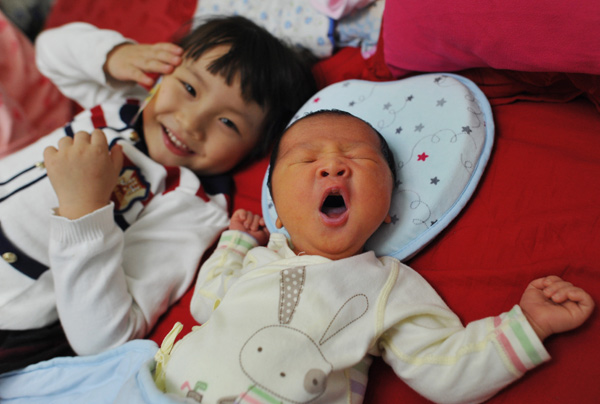Second-child policy spurs new spending in China
Updated: 2016-07-29 16:03
(chinaaily.com.cn)
|
||||||||
 |
|
A girl plays with her newborn brother at a hospital in Nanjing, Jiangsu province,on Oct 24. 2014. [Photo/VCG] |
The easing of one-child policy last year has led to much more spending in the maternal and infant markets and thus boosting the economy, according to a report by Guangzhou Daily.
From medical care, to clothing, toys and education, all the related industries have seen a boom in their businesses, it said.
According to Jianke.com, a leading online drug store, its sales of prenatal vitamins have increased over 60 percent in the second quarter this year.
Women visitors to the website also rose by 45.3 percent, while fertility drugs for men and male visitors grew by 39 percent and 51 percent respectively.
Xie Fangmin, CEO of Jianke.com, said he believed the surge in sales is largely fueled by the new demand of those planning to have a second baby with the change in the nation's one-child policy.
In hospitals in Guangzhou, south Guangdong province, pregnant women are finding it harder to get a doctor's appointment.
A mother-to-be, surnamed Wang, said she had to get up very early every time to see a doctor to avoid the long line, a situation rarely seen last year.
The related service sector also felt the profits brought by the new policy.
Wu Ruixi, manager of a local child photography studio, said the business will grow at least 30 percent and that the store has started training new employees and expanding its office space.
Seeing the possibility of a spiraling growth in maternal and infant market, businessmen are shifting some of their attention from other businesses to the area.
Guangzhou now boasts over 500 baby and mother specialty stores. In the city's major commercial street Shangxiajiu, many clothing stores have transformed themselves into baby bath services.
According to the communiqué issued late last year after the conclusion of the Fifth Plenary Session of the 18th Communist Party of China Central Committee, the family planning policy is to be changed to allow all couples to have two children.
China's family planning policy was first introduced in the late 1970s to rein in the surging population by allowing most urban couples to have only one child and most rural couples to have two children, if the first child was a girl. This policy has effectively controlled China's population, but it has also resulted in a looming shortage in the working age population.
In the face of the ever-declining birth rate and the challenge of an aging society, the central government began to ease the family planning policy in 2013, allowing couples of which the husband or wife is an only child to have a second child.
The new adjustment aims to rebalance China's population and is expected to help the nation achieves its short-term and long-term goals of social and economic development.
- S. Korea to launch WWII 'comfort women' victims foundation
- China to become Australia's biggest tourist source market
- Patient shoots, kills doctor in Berlin then kills himself
- One of church attackers tried to join IS in Syria
- China's coal usage may peak by 2020, experts say
- Bavarian bomber pledged allegiance to Islamic State

 In pictures: Aerial images of Rio's Olympic venues
In pictures: Aerial images of Rio's Olympic venues
 Images reveal distinctive Tunpu culture in Guizhou
Images reveal distinctive Tunpu culture in Guizhou
 Ten photos from around China: July 22 – 28
Ten photos from around China: July 22 – 28
 Welcome back, daddy!
Welcome back, daddy!
 Sweat, hard work and pain: Life of model
Sweat, hard work and pain: Life of model
 Top 10 most profitable companies in the world
Top 10 most profitable companies in the world
 Exhibition showcases Chinese artworks in London
Exhibition showcases Chinese artworks in London
 In pics: Cool ways to beat the heat wave
In pics: Cool ways to beat the heat wave
Most Viewed
Editor's Picks

|

|

|

|

|

|
Today's Top News
Ministry slams US-Korean THAAD deployment
Two police officers shot at protest in Dallas
Abe's blame game reveals his policies failing to get results
Ending wildlife trafficking must be policy priority in Asia
Effects of supply-side reform take time to be seen
Chinese State Councilor Yang Jiechi to meet Kerry
Chinese stocks surge on back of MSCI rumors
Liang avoids jail in shooting death
US Weekly

|

|









